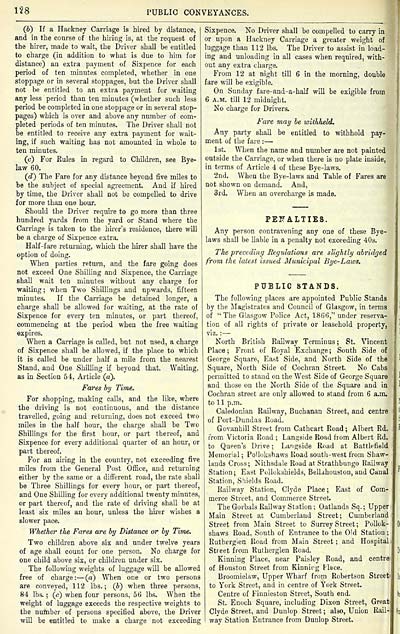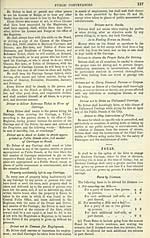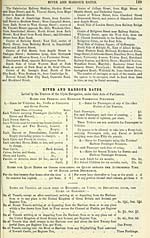Download files
Complete book:
Individual page:
Thumbnail gallery: Grid view | List view

128
PUBLIC CONVEYANCES.
(6) If a Hackney Carriage is hired by distance,
and in the course of the hiring is, at the request of
the hirer, made to wait, the Driver shall he entitled
to charge (in addition to what is due to him for
distance) an extra payment of Sixpence for each
period of ten minutes completed, whether in one
stoppage or in several stoppages, but the Driver shall
not be entitled to an extra payment for waiting
any less period than ten minutes (whether such less
period be completed in one stoppage or in several stop-
pages) which is over and above any number of com-
pleted periods of ten minutes. The Driver shall not
be entitled to receive any extra payment for wait-
ing, if such waiting has not amounted in whole to
ten minutes.
(c) For Rules in regard to Children, see Bye-
law 60.
(d) The Fare for any distance beyond five miles to
be the subject of special agreement. And if hired
by time, the Driver shall not be compelled to drive
for more than one hour.
Should the Driver requii'e to go more than three
hundred yards from the yard or Stand where the
Carriage is taken to the hu-er's residence, there will
be a charge of Sixpence extra.
Half-fare returning, which the hirer shall have the
option of doing.
When parties return, and the fare going does
not exceed One Shilling and Sixpence, the Carriage
shall wait ten minutes without any charge for
waiting ; when Two Shillings and upwards, fifteen
minutes. If the Carriage be detained longer, a
charge shall be allowed for waiting, at the rate of
Sixpence for every ten minutes, or part thereof,
commencing at the period when the free waiting
expires.
When a Carriage is called, but not used, a charge
of Sixpence shall be allowed, if the place to which
it is called be under half a mile from the nearest
Stand, and One Shilling if beyond that. Waiting,
as in Section 54, Article (a).
Fares by Time.
For shopping, making calls, and the like, where
the driving is not continuous, and the distance
travelled, going and returning, does not exceed two
miles in the half hour, the charge shall be Two
Shillings for the first hour, or part thereof, and
Sixpence for every additional quarter of an hour, or
part thereof.
For an airing in the country, not exceeding five
miles from the General Post Office, and returning
either by the same or a different road, the rate shall
be Three Shillings for every hour, or part thereof,
and One Shilling for every additional twenty minutes,
or part thereof, and the rate of driving shall be at
least six miles an hour, unless the hirer wishes a
slower pace.
Whether the Fares are by Distance or by Time,
Two children above six and under twelve years
of age shall count for one person. No charge for
one child above six, or children under six.
The following weights of luggage will be allowed
free of charge: — (a) When one or two persons
are conveyed, 112 lbs.; (i) when three persons,
84 lbs. ; (c) when four persons, 56 lbs. When the
weight of luggage exceeds the respective weights to
the number of persons specified above, the Driver
will be entitled to make a charge not exceeding
Sixpence. No Driver shall be compelled to caiTy in
or upon a Hackney Carriage a greater weight of
luggage than 112 lbs. The Driver to assist in load-
ing and unloading in all cases when required, with-
out any extra charge.
From 12 at night till 6 in the morning, double
fare will be exigible.
On Sunday fare-and-a-half will be exigible from
6 A.M. till 12 midnight.
No charge for Drivers.
Fare may be withheld.
Any party shall be entitled to withhold pay-
ment of the fare : —
1st. When the name and number are not painted
outside the Carriage, or when there is no plate inside,
in terms of Article 4 of these Bye-laws.
2nd. When the Bye-laws and Table of Fares are
not shown on demand. And,
3rd. When an overcharge is made.
PENALTIES.
Any person contravening any one of these Bye-
laws shall be liable in a penalty not exceeding 40s.
The preceding Regulations are slightly abridged
from the latest issued Municipal Bye-Laws.
PUBLIC STANDS.
The following places are appointed Public Stands
by the Magistrates and Council of Glasgow, in terms
of " The Glasgow Police Act, 1866," under reserva-
tion of all rights of private or leasehold property,
viz, :■ —
North British Railway Terminus ; St. Vincent
Place ; Front of Royal Exchange ; South Side of
George Square, East Side, and North Side of the
Square, North Side of Cochran Street. No Cabs
permitted to stand on the West Side of George Square
and those on the North Side of the Square and in
Cochran street are only allowed to stand from 6 a.m.
to 11 p.m.
Caledonian Railway, Buchanan Street, and centre
of Port-Dundas Road.
Govanhill Street from Cathcart Road; Albert Rd.
from Victoria Road ; Langside Road from Albert Rd,
to Queen's Drive ; Langside Road at Battlefield i
Memorial ; Pollokshaws Road south-west from Shaw-
lands Cross; Nithsdale Road at Strathbungo Railway
Station; East PoUokshields, Bellahouston, and Canal
Station, Shields Road.
Railway Station, Clyde Place ; East of Com-
merce Street, and Commerce Street
The Govbals Railway Station ; Oatlands Sq. ; Upper
Main Street at Cumberland Street; Cumberland
Street from Main Street to Surrey Street ; Pollok-
shaws Road, South of Entrance to the Old Station ;
Ruthergien Road from Main Street ; and Hospital
Street from Ruthergien Road.
Kinning Place, near Paisley Road, and centre
of Houston Street from Kinnipg Place.
Broomielaw, Upper Wharf from Robertson Street
to York Street, and in centre of York Street.
Centre of Finnieston Street, South end.
St. Enoch Square, including Dixon Street, Great
Clyde Street, and Dunlop Street; also, Union Rail-
way Station Entrance from Dunlop Street.
PUBLIC CONVEYANCES.
(6) If a Hackney Carriage is hired by distance,
and in the course of the hiring is, at the request of
the hirer, made to wait, the Driver shall he entitled
to charge (in addition to what is due to him for
distance) an extra payment of Sixpence for each
period of ten minutes completed, whether in one
stoppage or in several stoppages, but the Driver shall
not be entitled to an extra payment for waiting
any less period than ten minutes (whether such less
period be completed in one stoppage or in several stop-
pages) which is over and above any number of com-
pleted periods of ten minutes. The Driver shall not
be entitled to receive any extra payment for wait-
ing, if such waiting has not amounted in whole to
ten minutes.
(c) For Rules in regard to Children, see Bye-
law 60.
(d) The Fare for any distance beyond five miles to
be the subject of special agreement. And if hired
by time, the Driver shall not be compelled to drive
for more than one hour.
Should the Driver requii'e to go more than three
hundred yards from the yard or Stand where the
Carriage is taken to the hu-er's residence, there will
be a charge of Sixpence extra.
Half-fare returning, which the hirer shall have the
option of doing.
When parties return, and the fare going does
not exceed One Shilling and Sixpence, the Carriage
shall wait ten minutes without any charge for
waiting ; when Two Shillings and upwards, fifteen
minutes. If the Carriage be detained longer, a
charge shall be allowed for waiting, at the rate of
Sixpence for every ten minutes, or part thereof,
commencing at the period when the free waiting
expires.
When a Carriage is called, but not used, a charge
of Sixpence shall be allowed, if the place to which
it is called be under half a mile from the nearest
Stand, and One Shilling if beyond that. Waiting,
as in Section 54, Article (a).
Fares by Time.
For shopping, making calls, and the like, where
the driving is not continuous, and the distance
travelled, going and returning, does not exceed two
miles in the half hour, the charge shall be Two
Shillings for the first hour, or part thereof, and
Sixpence for every additional quarter of an hour, or
part thereof.
For an airing in the country, not exceeding five
miles from the General Post Office, and returning
either by the same or a different road, the rate shall
be Three Shillings for every hour, or part thereof,
and One Shilling for every additional twenty minutes,
or part thereof, and the rate of driving shall be at
least six miles an hour, unless the hirer wishes a
slower pace.
Whether the Fares are by Distance or by Time,
Two children above six and under twelve years
of age shall count for one person. No charge for
one child above six, or children under six.
The following weights of luggage will be allowed
free of charge: — (a) When one or two persons
are conveyed, 112 lbs.; (i) when three persons,
84 lbs. ; (c) when four persons, 56 lbs. When the
weight of luggage exceeds the respective weights to
the number of persons specified above, the Driver
will be entitled to make a charge not exceeding
Sixpence. No Driver shall be compelled to caiTy in
or upon a Hackney Carriage a greater weight of
luggage than 112 lbs. The Driver to assist in load-
ing and unloading in all cases when required, with-
out any extra charge.
From 12 at night till 6 in the morning, double
fare will be exigible.
On Sunday fare-and-a-half will be exigible from
6 A.M. till 12 midnight.
No charge for Drivers.
Fare may be withheld.
Any party shall be entitled to withhold pay-
ment of the fare : —
1st. When the name and number are not painted
outside the Carriage, or when there is no plate inside,
in terms of Article 4 of these Bye-laws.
2nd. When the Bye-laws and Table of Fares are
not shown on demand. And,
3rd. When an overcharge is made.
PENALTIES.
Any person contravening any one of these Bye-
laws shall be liable in a penalty not exceeding 40s.
The preceding Regulations are slightly abridged
from the latest issued Municipal Bye-Laws.
PUBLIC STANDS.
The following places are appointed Public Stands
by the Magistrates and Council of Glasgow, in terms
of " The Glasgow Police Act, 1866," under reserva-
tion of all rights of private or leasehold property,
viz, :■ —
North British Railway Terminus ; St. Vincent
Place ; Front of Royal Exchange ; South Side of
George Square, East Side, and North Side of the
Square, North Side of Cochran Street. No Cabs
permitted to stand on the West Side of George Square
and those on the North Side of the Square and in
Cochran street are only allowed to stand from 6 a.m.
to 11 p.m.
Caledonian Railway, Buchanan Street, and centre
of Port-Dundas Road.
Govanhill Street from Cathcart Road; Albert Rd.
from Victoria Road ; Langside Road from Albert Rd,
to Queen's Drive ; Langside Road at Battlefield i
Memorial ; Pollokshaws Road south-west from Shaw-
lands Cross; Nithsdale Road at Strathbungo Railway
Station; East PoUokshields, Bellahouston, and Canal
Station, Shields Road.
Railway Station, Clyde Place ; East of Com-
merce Street, and Commerce Street
The Govbals Railway Station ; Oatlands Sq. ; Upper
Main Street at Cumberland Street; Cumberland
Street from Main Street to Surrey Street ; Pollok-
shaws Road, South of Entrance to the Old Station ;
Ruthergien Road from Main Street ; and Hospital
Street from Ruthergien Road.
Kinning Place, near Paisley Road, and centre
of Houston Street from Kinnipg Place.
Broomielaw, Upper Wharf from Robertson Street
to York Street, and in centre of York Street.
Centre of Finnieston Street, South end.
St. Enoch Square, including Dixon Street, Great
Clyde Street, and Dunlop Street; also, Union Rail-
way Station Entrance from Dunlop Street.
Set display mode to: Large image | Transcription
Images and transcriptions on this page, including medium image downloads, may be used under the Creative Commons Attribution 4.0 International Licence unless otherwise stated. ![]()
| Scottish Post Office Directories > Towns > Glasgow > Post-Office annual Glasgow directory > 1903-1904 > (1616) |
|---|
| Permanent URL | https://digital.nls.uk/86397211 |
|---|
| Description | Directories of individual Scottish towns and their suburbs. |
|---|
| Description | Around 700 Scottish directories published annually by the Post Office or private publishers between 1773 and 1911. Most of Scotland covered, with a focus on Edinburgh, Glasgow, Dundee and Aberdeen. Most volumes include a general directory (A-Z by surname), street directory (A-Z by street) and trade directory (A-Z by trade). |
|---|


